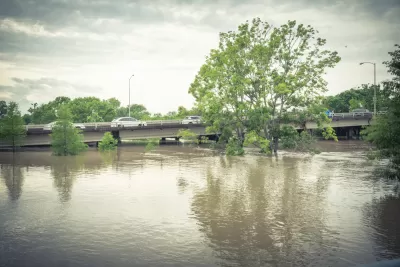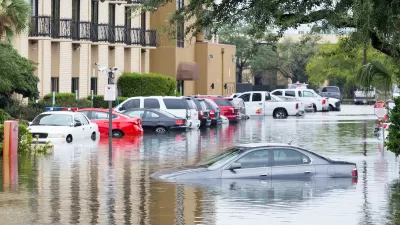The U.S. Army Corps of Engineers has revised a plan to protect the Houston region from flooding by tossing out a proposed tunnel and opting instead to dig Buffalo Bayou wider and deeper.

The U.S. Army Corps of Engineers on October 5 released an interim feasibility report that revised plans to address flooding in Houston, evolving a project launched in the wake of Hurricane Harvey.
Shawn Arraj reported on the news at the time of the interim report's release, noting that the Army Corps had decided against a building a network of underground tunnels leading away from the (Addicks and Barker) reservoirs.
The Army Corps dropped the plans for tunnels because of costs. "Initial cost estimates for the tunnels ranged from $2.2 billion-$12 billion," according to Arraj.
Given the lessons of Harvey and the critical importance of floodwater protections in the face of increasing numbers of extreme weather events, the Army Corps plan is still a frequent topic of discussion in the local news media—and the Houston Chronicle has run two article recently sharing the opinions of local stakeholders critical of the Army Corps' approach to stormwater resilience in the area.
The decision to dig the Buffalo Bayou wider and deeper is the subject of a recent article by Emily Foxhall, who focuses on the criticisms of conservationists who say the new plan reflects old-fashioned thinking at the Army Corps, and call for a nature-focused approach to resilience.
"People puzzled over why the Corps wasn't continuing to look at tunnels, considered less disruptive to communities, or excavating more dirt from the Addicks and Barker reservoirs, maybe building a new park space on top," writes Foxhall.
Another article by Lisa Gray provides an in-depth interview with Jim Blackburn, the co-director of the SSPEED Center at Rice University. When asked for an assessment of the report, Blackburn says it might have been a stroke of genius for riling up so much of the community. "It caused the community to really take this under their wing in a way that they may not have done otherwise," says Blackburn in the interview.
Public feedback on the October interim feasibility report is expected to help the Army Corps decide on a final proposal. The Harris County Flood Control District would need to approve the majority of funding for whatever project comes to fruition. Congressional approval will also be necessary.
FULL STORY: Digging Buffalo Bayou deeper? Houstonians up in arms over Army Corps' 'old-fashioned' flood fixes.

Planetizen Federal Action Tracker
A weekly monitor of how Trump’s orders and actions are impacting planners and planning in America.

Map: Where Senate Republicans Want to Sell Your Public Lands
For public land advocates, the Senate Republicans’ proposal to sell millions of acres of public land in the West is “the biggest fight of their careers.”

Restaurant Patios Were a Pandemic Win — Why Were They so Hard to Keep?
Social distancing requirements and changes in travel patterns prompted cities to pilot new uses for street and sidewalk space. Then it got complicated.

Platform Pilsner: Vancouver Transit Agency Releases... a Beer?
TransLink will receive a portion of every sale of the four-pack.

Toronto Weighs Cheaper Transit, Parking Hikes for Major Events
Special event rates would take effect during large festivals, sports games and concerts to ‘discourage driving, manage congestion and free up space for transit.”

Berlin to Consider Car-Free Zone Larger Than Manhattan
The area bound by the 22-mile Ringbahn would still allow 12 uses of a private automobile per year per person, and several other exemptions.
Urban Design for Planners 1: Software Tools
This six-course series explores essential urban design concepts using open source software and equips planners with the tools they need to participate fully in the urban design process.
Planning for Universal Design
Learn the tools for implementing Universal Design in planning regulations.
Heyer Gruel & Associates PA
JM Goldson LLC
Custer County Colorado
City of Camden Redevelopment Agency
City of Astoria
Transportation Research & Education Center (TREC) at Portland State University
Camden Redevelopment Agency
City of Claremont
Municipality of Princeton (NJ)




























